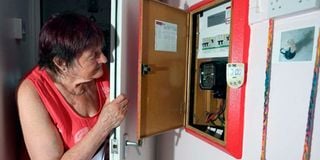Soaring fuel prices could cost lives in winter, charities warn

Pensioner Diane Skidmore examines her smart meter in London on August 25, 2022. Britain announced a vast 80-per cent hike in electricity and gas bills, in a dramatic worsening of the cost-of-living crisis before winter as the UK awaits a new leader.
What you need to know:
- The average UK household’s yearly bill for gas and electricity, currently £1,971, is set to soar by 80 per cent to £3,549 in October.
- Confronting those figures, charity experts fear the choice for some poorer people will rather lie between living and dying.
- Fish and chip shops, another staple of British life, are also facing hard times.
That an astronomical rise in fuel bills will force many people to choose between heating and eating has become a commonplace prediction here.
The average household’s yearly bill for gas and electricity, currently £1,971, is set to soar by 80 per cent to £3,549 in October, with another increase, to £5,386 per year, forecast next January.
Confronting those figures, charity experts fear the choice for some poorer people will rather lie between living and dying.
“We are going to lose a lot of people because they won’t be able to cope in their own homes in the winter months,” said Angie Comerford, who runs a foodbank in Hebburn, northeast England.
Money-saving expert Martin Lewis echoed those concerns. He said, “If we do not get further government intervention on top of what we got in May, lives will be lost this winter.”
Massive bills
Experts say the massive bills faced by consumers reflect the continued rise in wholesale gas prices, which began to surge as the world unlocked from the Covid pandemic, and were driven to record high levels by Russia slowly switching off gas supplies to Europe.
In anticipation of cold autumn and winter weather, one Newcastle upon Tyne charity put out an urgent appeal for donations of good quality blankets, new hot water bottles, flasks, socks, slippers, scarves, draught excluders and coats.
Foodbanks have seen a drop in donations, which one charity operator said was understandable because “everybody is tightening their belts and making cutbacks”.
A Durham truck driver who lives in a rented bungalow, Stewart Lauder, said his bills had almost tripled from £50 per month to £150 and he feared the effect of the October rise. “It’s got to the point where I am trying not to switch on the lights; as for heating, I try not to use it at all.”
Hard times are affecting businesses as well as private individuals.
Six of the country’s biggest brewers warned that thousands of pubs will shut because they are facing huge increases in fuel bills at a time when their customers have less money to spend at the bar.
“Without swift and substantial intervention from government, there is no doubt we will witness a huge number of pubs close their doors for good,” said the British Beer and Pub Association in an open letter.
Fish and chip shops, another staple of British life, are also facing hard times.
Potato prices are up due to heatwaves across Europe while cooking oil has risen by 20 per cent and cod by 70 per cent due to the war in Ukraine.
Despite the clamour for government help, no action is likely on bills until after a new prime minister, probably Liz Truss is chosen on September 5 to replace Boris Johnson.
* * *
You may think it is small compensation for everything this country has looted from Africa, but it was good to learn last week that at least some treasures are being handed back.
The Horniman Museum in London announced that it has agreed to return to Nigeria 72 artefacts stolen in the 19th century from the Kingdom of Benin.
They include 12 brass plaques known as Benin Bronzes, a brass cockerel and a key to the king’s palace.
Ms Eve Salomon, chair of the museum, said, “The evidence is very clear that these objects were acquired through force, and external consultations supported our view that it is both moral and appropriate to return their ownership to Nigeria.”
* * *
A survey of attitudes to social spending has highlighted three absolute no-nos. These, according to the average Brit, are leaving the pub before it is your turn to pay, ordering the most expensive items on the menu when you are splitting the bill, and failing to chip in for a workmate’s leaving gift.
* * *
A few observations about those people on the other side of the counter:
A potential client goes into a bank in Switzerland and, speaking softly, asks if he may open an account with two million dollars.
The teller replies, “You do not have to whisper here, sir. In our bank, poverty is no crime.”
A shopkeeper was alarmed to arrive at his store one morning and find a new business had opened next door and had put up a large sign saying BEST DEALS.
The next day, he was even more concerned to find the empty shop on the other side of his store had also been taken and a large sign said LOWEST PRICES. After some thought, he erected a sign over his own shop door. It read MAIN ENTRANCE.
A woman went into a shop and said, “I think I need a pair of spectacles.”
“You certainly do,” said the shopkeeper. “This is a grocery store.”
An aspiring magnate asks his bank manager, “How do I start a small business?”
The manager replies, “Start a large one and wait six months.”





